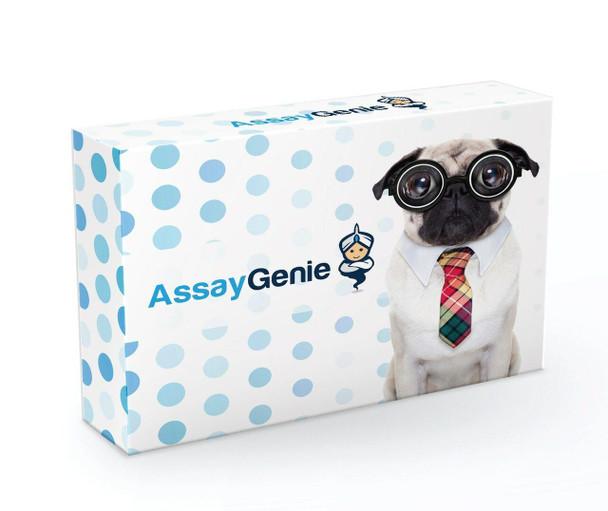Anti-EXOSC6 Antibody (CAB17252)
- SKU:
- CAB17252
- Product type:
- Antibody
- Reactivity:
- Mouse
- Host Species:
- Rabbit
- Isotype:
- IgG
- Antibody Type:
- Polyclonal Antibody
Frequently bought together:
Description
| 抗体名: | Anti-EXOSC6 Antibody |
| 抗体コード: | CAB17252 |
| 抗体サイズ: | 20uL, 50 uL |
| 申し込み: | WB |
| 反応性: | Mouse |
| 宿主種: | Rabbit |
| 免疫原: | A synthetic peptide of human EXOSC6. |
| 申し込み: | WB |
| 推奨希釈: | WB 1:500 - 1:2000 |
| 反応性: | Mouse |
| ポジティブサンプル: |
| 免疫原: | A synthetic peptide of human EXOSC6. |
| 精製方法: | Affinity purification |
| ストレージバッファ: | Store at -20°C. Avoid freeze / thaw cycles. Buffer: PBS with 0.02% sodium azide, 50% glycerol, pH7.3. |
| アイソタイプ: | IgG |
| 順序: | Email for sequence |
| 遺伝子ID: | 118460 |
| Uniprot: | Q5RKV6 |
| セルラーロケーション: | |
| 計算された分子量: | |
| 観察された分子量: | Refer to figures |
| 同義語: | EXOSC6, EAP4, MTR3, Mtr3p, hMtr3p, p11 |
| バックグラウンド: | This gene product constitutes one of the subunits of the multisubunit particle called exosome, which mediates mRNA degradation. The composition of human exosome is similar to its yeast counterpart. This protein is homologous to the yeast Mtr3 protein. Its exact function is not known, however, it has been shown using a cell-free RNA decay system that the exosome is required for rapid degradation of unstable mRNAs containing AU-rich elements (AREs), but not for poly(A) shortening. The exosome does not recognize ARE-containing mRNAs on its own, but requires ARE-binding proteins that could interact with the exosome and recruit it to unstable mRNAs, thereby promoting their rapid degradation. |
| UniProt Protein Function: | EXOSC6: Non-catalytic component of the RNA exosome complex which has 3'->5' exoribonuclease activity and participates in a multitude of cellular RNA processing and degradation events. In the nucleus, the RNA exosome complex is involved in proper maturation of stable RNA species such as rRNA, snRNA and snoRNA, in the elimination of RNA processing by-products and non-coding 'pervasive' transcripts, such as antisense RNA species and promoter-upstream transcripts (PROMPTs), and of mRNAs with processing defects, thereby limiting or excluding their export to the cytoplasm. The RNA exosome may be involved in Ig class switch recombination (CSR) and/or Ig variable region somatic hypermutation (SHM) by targeting AICDA deamination activity to transcribed dsDNA substrates. In the cytoplasm, the RNA exosome complex is involved in general mRNA turnover and specifically degrades inherently unstable mRNAs containing AU-rich elements (AREs) within their 3' untranslated regions, and in RNA surveillance pathways, preventing translation of aberrant mRNAs. It seems to be involved in degradation of histone mRNA. The catalytic inactive RNA exosome core complex of 9 subunits (Exo-9) is proposed to play a pivotal role in the binding and presentation of RNA for ribonucleolysis, and to serve as a scaffold for the association with catalytic subunits and accessory proteins or complexes. Belongs to the RNase PH family. |
| UniProt Protein Details: | Protein type:Nucleolus; EC 3.1.13.-; Ribonuclease Chromosomal Location of Human Ortholog: 16q22.1 Cellular Component: cytosol; exosome (RNase complex); nuclear exosome (RNase complex); nucleolus; nucleoplasm Molecular Function:exoribonuclease activity Biological Process: DNA deamination; isotype switching; regulation of mRNA stability; rRNA 3'-end processing; rRNA catabolic process; rRNA processing |
| NCBI Summary: | This gene product constitutes one of the subunits of the multisubunit particle called exosome, which mediates mRNA degradation. The composition of human exosome is similar to its yeast counterpart. This protein is homologous to the yeast Mtr3 protein. Its exact function is not known, however, it has been shown using a cell-free RNA decay system that the exosome is required for rapid degradation of unstable mRNAs containing AU-rich elements (AREs), but not for poly(A) shortening. The exosome does not recognize ARE-containing mRNAs on its own, but requires ARE-binding proteins that could interact with the exosome and recruit it to unstable mRNAs, thereby promoting their rapid degradation. [provided by RefSeq, Jul 2008] |
| UniProt Code: | Q5RKV6 |
| NCBI GenInfo Identifier: | 74736141 |
| NCBI Gene ID: | 118460 |
| NCBI Accession: | Q5RKV6.1 |
| UniProt Related Accession: | Q5RKV6 |
| Molecular Weight: | 28,235 Da |
| NCBI Full Name: | Exosome complex component MTR3 |
| NCBI Synonym Full Names: | exosome component 6 |
| NCBI Official Symbol: | EXOSC6 |
| NCBI Official Synonym Symbols: | p11; EAP4; MTR3; Mtr3p; hMtr3p |
| NCBI Protein Information: | exosome complex component MTR3 |
| UniProt Protein Name: | Exosome complex component MTR3 |
| UniProt Synonym Protein Names: | Exosome component 6; mRNA transport regulator 3 homolog; hMtr3; p11 |
| UniProt Gene Name: | EXOSC6 |
| UniProt Entry Name: | EXOS6_HUMAN |

